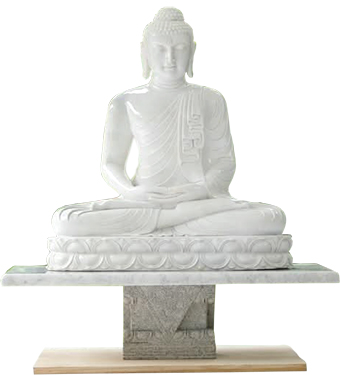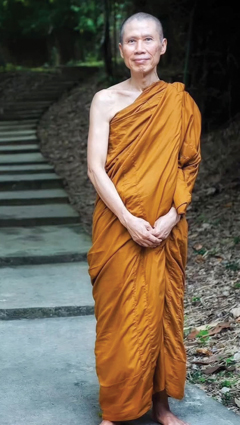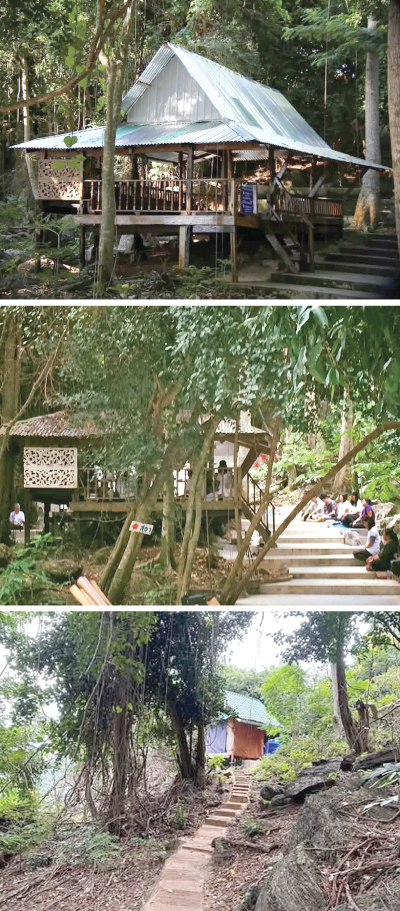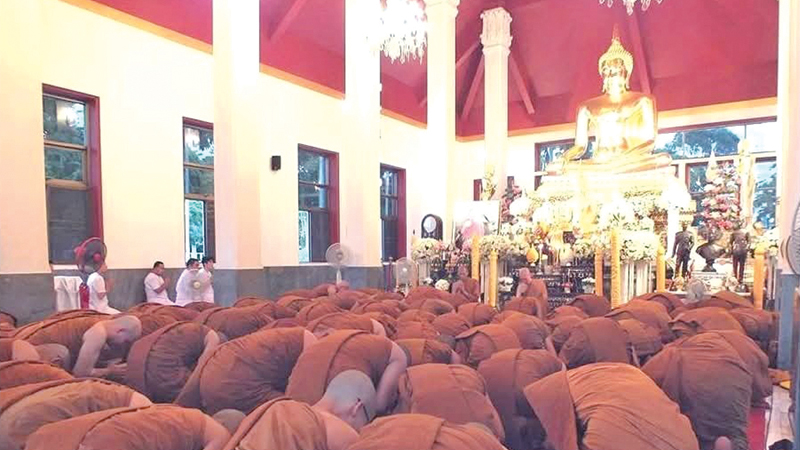The following are excerpts from an interview with Theravada bhikkhu Ven. Ajahn Suchart Abhijato Maha Thera of Thailand. The Maha Thera is well known across the globe for his effective Dhamma teaching methods and meditation practice.
Q: How can lay Buddhist practitioners balance the demands of modern life with the commitment to Seela, Samadhi, and Pragna? How can they balance both?
A: It depends on how strong your moral resolve is. The stronger your morality, the more Precepts you can keep. If your mind is not strong, then you cannot keep them as well. So it depends on how you would prefer to live – a moral life or an immoral life, a material life or a spiritual life.
 The balance can vary from person to person. It depends on your choices or your preferences.
The balance can vary from person to person. It depends on your choices or your preferences.
Q: Is true detachment possible without renunciation? And what does that mean for householders on the path? I mean for lay people.
A: Detachment comes from equanimity. Once you have equanimity, you’re detached from everything. It doesn’t matter whether you’re a householder or a renunciate – if you don’t have equanimity, you remain attached.
Q: How should a Buddhist meaningfully celebrate Vesak? Should greater emphasis be placed on āmisa pūjā because a lot of people make Vesak lanterns and place emphasis on that, or should we focus more on Patipatti Puja?
A: You should do both. In the morning, you give to charity, and then in the evening, you practise meditation.
Q: How is gratitude understood in Buddhist teachings, and how does it differ from attachment or obligation?
A: It’s what you call good practice. It’s to be grateful to whoever helps you and makes your life better. So whenever you have the chance in the future, if you can return the favour, then you should do it. But it doesn’t mean that you have to feel obligated because the person who actually helps you doesn’t expect anything from you in the first place.
When you give Dana, you don’t expect anything back. But the person who received the Dana should be grateful to that person. In the future, the roles might reverse – the one who once gave may fall on hard times, while the one who received may prosper. In such circumstances, it would be appropriate to return the kindness.
Q: How can the Right Speech (in the Noble Eightfold Path) be upheld in this age of social media and instant communication?
A: Be mindful before you say anything. Ask yourself if you are breaking the Precept or not before you speak or post.
Q: When we meditate, sometimes we get disturbing thoughts and find it very difficult to maintain concentration. When we get a disturbing thought during meditation, is it okay to concentrate on that disturbing thought—I mean, to explore why we got that disturbing thought—rather than continuing with meditation?
A: No. You may need to change your technique. If you’re watching your breath and finding it difficult, you should switch to chanting instead. Ignore the thoughts. Don’t engage with them because when you analyse them, you’re creating more thoughts. You need to reduce thinking, not increase it. Just ignore the disturbing thoughts and concentrate on either your chanting or the mantra.

Ven. Ajahn Suchart
Abhijato Maha Thera
If you cannot concentrate on your breath or mantra, then switch to chanting. Sometimes a different meditation technique is more effective when the mind is particularly restless.
Q: Does one acquire merit by simply viewing the sacred relics of the Buddha or arhants? Has the Buddha ever mentioned the benefits or significance of paying homage to his relics or those of the Arahants
A: The purpose is really to reinforce our faith in the Buddha and the Arahants—that they are real. They’re not fantasy, so you don’t have to be doubtful about whether the Buddha actually existed or not, whether the Arahants existed or not. They did. And this is the remains. The remains are special because they don’t break down into dust like ordinary remains would. The element—the relic—is like a piece of rock, a piece of stone, that doesn’t break down like other bones. And it only happens to the Buddha or Arahants who have this type of relic.
Q: The Buddha said that Buddhists, or anyone who follows him, should at least, once in their lifetime, see the place where a Buddha was born, the place where he attained Enlightenment, and the place where he entered Parinirvana.
A: Yes, it’s probably in the Tipitaka, but I don’t know the exact reference. However, this is what we’ve been told all our lives—that if we have the chance, we should go and visit these three places, because it will reinforce our faith in the Buddha, Dhamma, and the Sangha. But it’s not mandatory or necessary, because many Thai forest teachers didn’t go to these places, yet they still became enlightened. Once your belief is strong enough to push you hard into practice, then you don’t really need to go. Visiting these places helps strengthen belief and encourage practice. If you’re already practising diligently, there’s no need to go. But if you’re still doubtful, visiting may help dispel that doubt.
Q: Could you recommend some Buddhist Dhamma books to help deepen one’s understanding of the Dhamma?
A: Well, the major Suttas are a good place to start. As I mentioned earlier, the First Discourse, called the Dhammacakkappavattana Sutta, the Satipatthāna Sutta (Four Foundations of Mindfulness), and the Mangala Sutta are particularly helpful. These Suttas can strengthen your faith. If possible, also study the life of the Buddha—it can be deeply inspiring.
Q: Many are not fluent in Pali, so they have to rely on English or Sinhalese translations. Are these reliable?
A: Yes, the translations are quite accurate. You can learn the story of how the Buddha was born, how he developed wisdom, how he eventually became a bhikkhu, and how he attained Enlightenment. His life story can inspire your practice.
Q: In garbage bins, we see millions of worms. Is it possible for a human being to be reborn as a worm in the next life?
A: Yes. If someone has done bad karma, they might be reborn as an animal, some type of animal.
Q: But worms seem to just appear on the earth. How do they suddenly come in millions? Can a human being be reborn as a worm?
 A: Yes, certainly, because there are millions of human beings. The mind doesn’t die with the body. After death, the mind continues and may take rebirth as worms, fishes, or any form of life, depending on the kamma performed, especially if it was bad Kamma.
A: Yes, certainly, because there are millions of human beings. The mind doesn’t die with the body. After death, the mind continues and may take rebirth as worms, fishes, or any form of life, depending on the kamma performed, especially if it was bad Kamma.
Q: Can a country remain poor because of the collective bad karma of its people?
A: This is a question that the Buddha said is incomprehensible to us. So don’t worry about it.
Q: How can we prove that rebirth is real? I mean, when a person is hypnotised and speaks about past lives, does that count as scientific evidence that rebirth is real?
A: First of all, you have to know whether the person is speaking the truth or not. If the person speaks the truth, then okay. Past life has been talked about. Even the Buddha himself talked about his past life. In order for us to be able to actually remember our past life, we have to get into the psychic mode or samadhi. Otherwise, we will not be able to recollect our past lives.
Q: I read that when a person is hypnotised, they usually speak about their past lives.
A: No, don’t worry about it. Just keep the Kalama Sutta as your guide. You don’t have to believe everything that you hear until you can prove it otherwise.
Q: When a person or a loved one is going through a difficult time, especially with illness, Buddhists often recite Pirith, such as the Antaraya Niwarana Sutta. Can chanting such Pirith truly help to bless a person who is sick?
A: No. The person who is sick should be the one who does the chanting. This is a way of developing mindfulness and meditation. When the mind becomes calm, it is not affected by the illness of the body.
Q: So the other person can’t do it on behalf of the sick person?
A: If you can listen to the chanting and focus your mind without thinking about other things, it can be helpful. The other person can chant for the sick person, but the one listening must do so with mindfulness, without thinking about anything else/distractions. This way, the mind can become calm, leading to more peace and less torment.
Q: Is it possible to extend one’s lifespan by releasing animals that are destined for slaughter? Is it possible to extend one’s lifespan through the merit gained from that?
A: The Buddha said that the only way to extend a person’s lifetime is by developing the four iddhipāda, the four mental faculties or four mental powers.
Q: Can a person do so during this particular birth?
A: As the Buddha said, if he wanted to, he could extend his life for another 20 years. But he would first need someone to look after his body. He spoke to Ananda Thera about this, but Ananda Thera didn’t fully understand the message and didn’t ask the Buddha to extend his life.
The Buddha then thought it was probably because Ananda Thera didn’t want to serve him anymore. The Buddha also said he didn’t want to impose on Ananda Thera, making him serve him for another 20 years. In the end, he decided not to use his mental powers to extend his life.
Q: When we meditate, sometimes we hear unusual sounds that don’t seem to come from our surroundings. Why do we experience such sounds? Is it some sort of influence, or why does this happen when we try to concentrate?
A: You don’t need to worry about understanding them. What you need to focus on is how to deal with them. The way to deal with such sounds is to simply ignore them.
They are distractions to your meditation. Stay focused on your meditation object. If you’re watching your breath, just keep watching your breath. If you’re reciting a mantra, continue reciting it and ignore everything else that arises during your meditation.
Q: Is there such a thing as a perfect death? Does it occur when one passes away thinking about the Dhamma?
A: All Arhants and Noble disciples have peaceful deaths. They have no worries or attachment to the body.
Q: I mean, for a normal person—someone who is not yet an Arahant or Sotāpanna—if such a person passes away thinking about the Dhamma, can’t we call it a peaceful death?
A: It depends on whether the person has enough mindfulness to overcome the defilements that cause restlessness, agitation, or fear.
Q: Is one meal a day sufficient for a meditator, or is it suitable for anyone, whether they meditate or not?
A: Normally, it is for meditators, because if you work, you might use a lot of energy, and one meal a day might not be sufficient to provide you with the needed energy for your work.
Q: Is the experience of entering jhāna similar to reaching the Gamma brainwave state as understood in psychology, where brainwave activity is associated with heightened focus and mental clarity?
A: The mind and the body can affect /influence each other. When the mind becomes calm, the body also becomes calm. So, the brainwave patterns will be different when the body is not calm. They (Scientists) are actually measuring the body, not the mind, just the effect the mind has on the body.
A person once told me that he has a watch that tells him that he goes to sleep when he is meditating (in jhāna). I told him it’s because the watch cannot measure whether he is mindful or not.
When you are in jhāna or in Samadhi, it is like you are going to sleep. But the difference is that when you are in jhāna, you are not asleep; you are still mindful. If you are asleep, it means that you do not have mindfulness. But it is the same state that the watch is measuring.
– Ven. Ajahn Suchart Abhijato Maha Thera was born on November 2, 1947. Having completed his degree in Civil Engineering at California State University, Fresno, USA, he returned to his motherland, where he designed an ice cream parlour for a brief stint.
Quite soon, inspired by a Dhamma book, he decided to go in search of “true happiness,” to find inner peace through the practice of Buddhist meditation. He became a bhikkhu at the age of 27 and received ordination at Wat Bovornives in Bangkok on February 19, 1975, with Somdet Phra Ñanasarivara, the late Supreme Patriarch (Somdet Phra Sangharaja), as his Preceptor.
Ven. Ajahn Suchart Abhijato Maha Thera resides in Wat Yansangwararam, Thailand.







